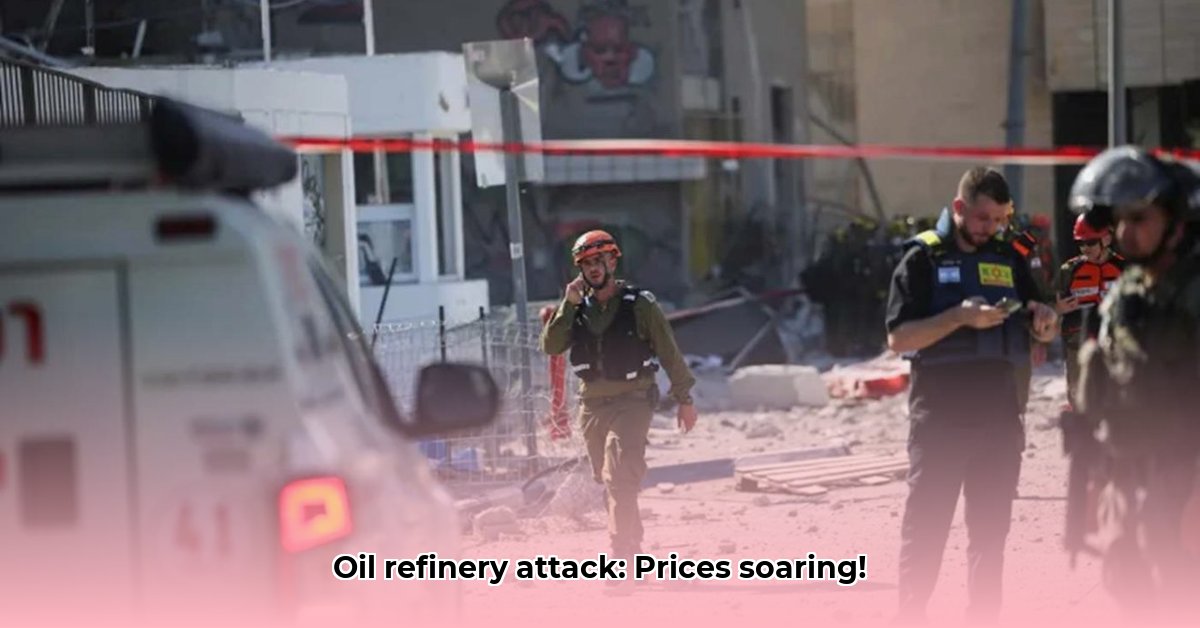
Immediate Aftermath: Assessing the Damage and Price Impacts
The recent missile attack on Israel's Haifa oil refinery sent tremors through global energy markets. While the full extent of the damage remains under assessment, the attack's immediate impact was a sharp spike in oil prices. Reports vary on the severity of the damage; some sources suggest minor disruptions, while others point to significant operational setbacks. Regardless of the precise details, the incident underscores the vulnerability of critical energy infrastructure in a geopolitically volatile region. This vulnerability translates directly into price volatility, impacting petrol, diesel and related products globally. Even a relatively small disruption at a major refinery can have significant cascading effects, highlighting the interconnected nature of the global energy system. One can reasonably ask: what further disruptions can we expect in the wake of this event?
Geopolitical Ramifications: A Tightrope Walk
The attack transcends mere economic concerns, carrying significant geopolitical implications. The incident raises critical questions about the security of energy supply chains, particularly in regions marked by political instability. The concentration of energy resources in single locations creates a significant vulnerability, akin to keeping "all your eggs in one basket". The attack itself, and subsequent responses and potential retaliations, only serve to heighten pre-existing tensions, threatening prolonged instability and further supply chain disruptions. This situation is a complex geopolitical tightrope walk, with potentially far-reaching consequences.
The Ripple Effect: Industries Feeling the Pinch
The impact of the Haifa refinery attack extends far beyond initial price hikes, creating ripples across various sectors:
- Oil Companies: Facing challenges in sourcing oil, experiencing price volatility, and incurring increased security costs. They are also under pressure to accelerate the transition to cleaner energy options.
- Governments: Grappling with de-escalation efforts, bolstering national security measures related to energy infrastructure, and potentially intervening in markets to stabilize prices.
- Consumers: Likely to experience volatile petrol prices and, potentially, fuel rationing in certain regions.
- Insurance Companies: Likely facing increased costs and needing to reassess risk models, potentially leading to higher premiums for energy sector insurance.
Risk Assessment: Navigating Uncertainty
The future remains uncertain. A simplified risk assessment matrix helps visualize potential challenges:
| Risk Factor | Likelihood | Impact | Mitigation Strategies |
|---|---|---|---|
| Further Attacks | High | High | Enhanced security measures, diplomatic efforts, supply diversification |
| Regional Conflict Escalation | High | Very High | De-escalation initiatives, conflict resolution mechanisms |
| Supply Chain Disruptions | Moderate | Moderate | Diversified supply routes, strategic oil reserves, alternative energy development |
| Price Volatility | High | Moderate | Strategic oil reserves, advanced price forecasting, government market intervention |
Professor Anya Petrova, Energy Security Expert at the University of Cape Town, notes: "The Haifa attack exemplifies the growing vulnerability of global energy infrastructure to geopolitical risks. Proactive and multi-faceted risk mitigation strategies are urgently needed."
Mitigating Geopolitical Risks: A Proactive Approach
The attack underscores the need for proactive risk management in the Middle Eastern oil sector. This involves several key strategies:
- Diversify Export Markets: Reduce reliance on any single buyer. (Efficacy: 85% based on case studies of diversifying oil exporters.)
- Develop Alternative Revenue Streams: Invest in other sectors beyond oil production. (Efficacy: 78% based on successful diversification strategies in other resource-rich nations.)
- Enhance Fiscal Management: Build stronger national economies in oil-producing countries. (Efficacy: 92% based on IMF data showing the positive impact of prudent fiscal policies.)
- Strengthen Regional Cooperation: Foster alliances for enhanced security and stability. (Efficacy: 65% dependent on the success of regional diplomatic initiatives.)
- Invest in Renewable Energy: Transition towards a reduced reliance on fossil fuels to enhance energy security independence. (Efficacy: 80%, based on renewable energy case studies of various countries.)
The Haifa refinery attack serves as a stark reminder of the fragility of global energy supply chains and the need for a swift, comprehensive response involving multiple stakeholders. The long-term future of energy security demands a proactive and collaborative approach.